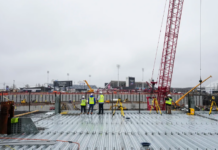A union-backed workers’ advocacy group has teamed with local unions to fight plans by a group of affiliated structural steel fabrication and crane rental companies to open three new bases in Newburgh, Port Jervis and the Town of Ulster, The Times Herald-Record reports.
The New York City Community Alliance for Worker Justice has lodged several claims against U.S. Crane & Rigging and its affiliated companies at planning board and industrial development agency meetings across Orange and Ulster counties in recent months, the local newspaper says.
The alliance has been joined by the Hudson Valley Building and Construction Trades Council. The unions allege exploitatively low pay, worker discrimination and poor safety records at companies operated by Thomas Auringer of Freeport.
“It would probably be easy for us to call them and say ‘Build union, and we’ll leave you alone,’ but this company is just no good,” the newspaper quoted Todd Diorio, president of the local trades council and business manager of Laborers’ Local 17 as saying. “There’s been a very bad track record from Department of Labor issues, safety violations and discrimination. We don’t think this is a good company to be giving any (tax) benefits to.”
A staff member in Auringer’s Queens headquarters referred questions to his attorneys, Kevin Nash of Goldberg, Weprin, Finkel, Goldstein in Manhattan and Timothy McColgan, Auringer’s general counsel, who works in New Paltz and New Rochelle.
Nash and McColgan say the union-backed worker advocacy group’s claims are a smear campaign launched because the family owns and operates some of the largest nonunion crane and construction companies in the city.
Nash said the protest “is nothing more than a way for the union to undermine his highly competitive nonunion companies, as he has become a very important force in the construction business in New York City.”
The newspaper reports that Auringer’s proposed local projects are in different stages.
In Port Jervis, Auringer plans a $27 million, 66,200-sq. ft. project, including two 30,000-sq. ft. buildings for storing and transferring construction demolition supplies plus space to fabricate structural steel. The facility at 100-200 Skyline Dr. would operate under the name Skyline Transfer Station, LLC and employ 54.
Google maps view of the 100 -200 Skyline Dr. site (Google maps)
In In the Town of Ulster, Auringer’s U.S. Crane LLC plans to operate, lease and maintain $11 million worth of new tower cranes at 2-4 Kieffer Lane, across from Urban Precast, LLC, one of Auringer’s hollow-core precast manufacturing facilities. The project, on the site of the former B. Millens and Sons, Inc., metal recycling plant, would create 18 jobs. The company has applied to the Ulster County Industrial Development Agency for nearly $1 million in sales and use tax exemptions.
In In the Town of Newburgh, the Planning Board recently approved a $21 million, 66,100-sq. ft. structural steel fabrication plant to be operated by U.S. Crane & Rigging at 18 Route 17K. The Orange County Industrial Development Agency (IDA) recently granted sales and use tax exemptions.
Laurie Villasuso, chief operating officer of the Orange County IDA, said in the published report that the IDA’s recent decision was based on the town’s recommendation that a smaller benefit was more appropriate given the community’s development needs.
“If there were irrefutable proof that U.S. Crane was a bad company, I can’t imagine the IDA board wouldn’t include that in their decision,” Villasuso said. “But the board listened to both sides and decided that it would create the jobs it set out to create. The board’s main criteria is to consider a project’s economic impact.”
OSHA notices of complaint
Eddie Jorge, an organizer and coordinator with the workers’ advocacy alliance, countered that there are plenty of reasons Auringer’s companies shouldn’t be welcomed in the mid-Hudson.
The businesses have have faced more than $230,000 in fines for New York City Environmental Control Board violations, though the final total was $140,000 because some of the fines were dismissed or reduced.
Since 2005, they have logged more than 60 Occupational Safety and Health Administration notices of complaint, including citations for unqualified operators and for cranes collapsing and tipping over, according to public records.
In February 2008, for example, an elevator technician employed by Auringer’s SSB Hoist was killed “when his head became caught between a hoist car guardrail and a metal plate,” according to an OSHA report that cited the company for three serious violations.
In another incident, in 2009, part of an Auringer mobile crane plummeted to the ground as workers dismantled it in Columbus Square, according to reporting from TheRealDeal.com, a New York real estate news site.
“Each and every one of those OSHA notices of complaint were responded to and many were contested, reduced and dismissed,” said McColgan, Auringer’s general counsel, who added that the violation total for Auringer’s companies is small considering that his firms have helped erect 1,000 buildings over roughly three decades.
Orange County Partnership president and CEO Maureen Halahan similarly defended Auringer and his companies.
The partnership is a local nonprofit tasked with attracting businesses to the county, and it has sought to help the Auringers build their Newburgh plant.
“When you’re in business for as long as they’ve been, for decades, you’re going to have some OSHA violations,” said Halahan, who added that the partnership has witnessed plenty of disputes between union and nonunion firms over its 30-year history.
“From our perspective, and from our relationship with U.S. Crane, and from what we’ve heard from (other) companies, they’re a good crane company,” Halahan added. “So, our job is to get (them) through the approval process and bring jobs to Orange County.”
Litigation against owner
Auringer has also faced his share of media scrutiny and litigation.
Employees filed a 2015 class-action suit claiming his company violated federal minimum wage and overtime laws, and two employees filed a suit in 2008 making similar claims.
In 2014, dozens of Auringer’s workers walked off a Pace University dorm construction site to protest what they called wage theft and unfair working conditions.
And employees of the Auringers’ other companies, including Carrol Turner, a Jamaican worker, have attracted media attention by claiming that Auringer family members called them racial epithets.
In October 2014, LaFondra Brown, a former Urban Erectors worker, alleged her managers stole her wages, called her a monkey, spat at her, and sexually harassed her. She also claimed her eyes were injured after she was ordered to weld with no mask despite not being a licensed welder.
Auringer’s attorneys responded that all of the aforementioned litigation against Auringer had been settled favorably, including a paltry amount for Brown for what McColgan termed a “nuisance claim.”
“Those allegations that Tom is racist or sexist are ridiculous,” McColgan said. “All of Tom’s children are biracial, four of whom, including his transgender child, hold supervisory positions within his companies.”
Halahan cautioned against making negative inferences about Auringer’s businesses based on lawsuits.
“Sometimes, there are a whole lot of allegations that are unfounded, but after you do some research you find that something was settled out of court,” Halahan said.
Nash agreed, calling Auringer “a solid businessman who’s gotten through a lot of litigation … No one has been injured, and there were no deaths on any of these cranes,” which are often set up by the customers renting them.
“Yes, crane work is dangerous, but they have a very good overall safety record,” Nash added. “No crane company is free of any accidents.”
McColgan said the unions have spent years trying to “subvert” the family’s companies because they’re nonunion.
The companies “are under constant scrutiny” by IDAs, the state Labor Department, the Workers Compensation Commission, OSHA and auditors, McColgan said.
“How could we possibly expand and grow if we were doing all that the unions are claiming?” McColgan asked. “We don’t have any problems with the unions. If they could come to us and give us a good bid, we’d give them the jobs.”
McColgan threatened that Auringer could sue the unions if their accusations go too far.
“The question is: ‘Do we want to get mired down in (the unions’) defamation, or do we do what we do, which is focus on creating jobs?’” McColgan added.
Regardless, the unions face a tough task in stopping Auringer’s projects.
The state-mandated environmental review process and local zoning laws don’t allow planning boards to consider how a company treats its employees, said Ulster County Planning Director Dennis Doyle.
“You won’t find those kinds of discussions (of a company’s character) in a typical zoning statute,” Doyle said in the Times Record-Herald article. “Broadly speaking, it’s the use, not the ownership, that’s considered.”










